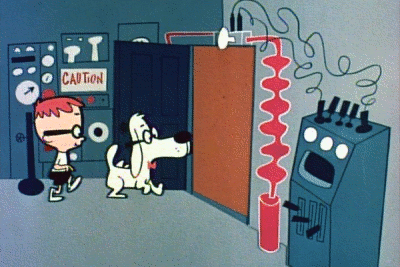
It happened 4 years ago this weekend, and Congress has already forgotten
Four years ago, on September 14-15, 2008, the Lehman Brothers investment bank declared bankruptcy while Bank of America acquired another foundering investment bank, Merrill Lynch -- major events that froze the financial markets and led in a few days to a $700 billion bailout of the financial system. Just four years later, some in the Congress have forgotten that real people and the economy are still suffering from the financial collapse, as it steps up Wall Street-backed efforts to prevent regulators from protecting the public.

Let’s join Mr. Peabody and his boy Sherman (Wikipedia) to go back just a short four years in their WABAC (Way Back) Machine. Four years ago this week, on Sunday, September 14, 2008, the Lehman Brothers investment bank announced it would declare bankruptcy while Bank of America announced it would acquire another foundering investment bank, Merrill Lynch. These events happened the next day on September 15 (NY Times has more on these events). Then, on September 16, the Reserve Primary Fund, a major money market fund, “broke the buck“ when its share value dropped to 97 cents. On that same day, the Federal Reserve had to bail out (to the tune of $85 billion) an insurance company of sorts, AIG, that had been providing credit protection in the largely unregulated derivatives marketplace — in the form of credit default swaps — to Lehman and others for their mortgage securities that were collapsing rapidily in value, but AIG didn’t have any cash for collateral. A few days later, on September 21, the remaining Wall Street investment banks, Goldman Sachs and Morgan Stanley, (the weakest, Bear Stearns, had failed months earlier) were allowed to convert to bank holding companies so they could hide under the Federal Reserve’s umbrella and gain access to its low-cost loan facilities and other federal safety net benefits.
These events roiled and ultimately froze the financial markets, starting an extraordinary series of September federal actions to shore up Wall Street and ultimately bail out the entire financial system. Wall Street’s shenanigans throughout the earlier part of the decade had led first to the collapse of the mortgage market and now to the complete destruction of the economy. By October 3, legislation providing a $700 Billion taxpayer-backed bank bailout was signed by President Bush. Nevertheless, millions of Americans lost homes, millions more lost jobs and millions more lost trillions of dollars in home equity and retirement fund values. Responsible homeowners are still underwater; cities and states are still suffering; the economy has still not recovered.
Fast Forward to 2010: On July 21, 2010 President Obama signed the Wall Street Reform and Consumer Protection Act, which gave new powers to financial regulators to prevent reckless financial practices from causing economic contagion again. The law also established a landmark new Consumer Financial Protection Bureau and enacted numerous reforms to the mortgage marketplace.
Now leave the Way Back Machine and return to today, September 2012: Like ants, industry lobbyists swarm the regulatory agencies asking for delays, exceptions and loopholes to important rules implementing derivatives marketplace reforms, trading reforms, executive pay disclosure reforms and consumer protection reforms. Meanwhile, the House has passed a series of bills to repeal the CFPB’s independence, roll back other parts of financial reform or cut off agency funding directly, but the Senate has so far stood firm.
However, over the past year, powerful special interests have changed tactics and instead decided to ask Congress to pass so-called regulatory reform laws that make it impossible for agencies that provide public protections to do their jobs.
Have those members of Congress forgotten that real people and the economy are still suffering from the financial collapse? Why else would they step up efforts to prevent regulators from protecting the public?
As I noted in my last blog post, “industry opponents of financial reform joined by other powerful special interests are trying to sneak controversial legislation, S.3468, the Independent Agency Regulatory Analysis Act, “under the radar.” The bill, which has had no hearings, would have the impact of tying all financial regulators (CFPB, FDIC, SEC, FRB, OCC, CFTC) and all other “independent agencies” from the CPSC to the FTC in redundant, excessive political and bureaucratic red tape so that they could not do their jobs. Even though he has announced that the proposal will no longer be voted on in committee next week, Chairman Joe Lieberman (CT) of the Senate Homeland Security and Government Affairs Committee has indicated November 15th is likely for a vote, again without a hearing (during the anticipated lame duck session).
The proposal is an extremely bad idea on financial reform issues alone. The Wall Street special interests who wrecked the economy in 2008 will be back to using $100 bills to fire up their big cigars if this bill becomes law. It elegantly delays, denies and defangs Wall Street reform by taking away the independence of bank regulators and requiring them to jump through redundant benefit-cost analysis and other hoops for a politicized White House bureaucracy known as the Office of Information and Regulatory Affairs (OIRA). The proposal would affect other important agencies that provide public protections. Unfortunately, Senator Lieberman has failed to issue a statement explaining why he would possibly want to move forward on this bill. In addition to defanging regulators, it would represent a massive shift of the balance of power from the legislative to the executive branch — all without a hearing. It’s worth repeating. All without a hearing.
Visit the PIRG-backed Coalition for Sensible Safeguards to learn more about this bill’s effect on financial, product safety and other reforms. You can also learn about numerous other proposed bills that pose threats to strong public protections.
As we said in our recent group letter to the hill opposing S3468:
Consider, for example, the impact S.3468 would have on the implementation of the Wall Street Reform and Consumer Protection Act. Two years after the passage of the Act, many critical new rules have not been completed. In large part, this is because of the cost-benefit processes independent financial agencies are already required to conduct defined in their organic statutes; the lawsuits brought by the financial industry on cost-benefit grounds have further delayed implementation. S.3468 would add numerous additional cost benefit analysis requirements, including approval by OIRA. S.3468 would add years to the process of getting new financial protections in place, or OIRA could delay them indefinitely. This signature achievement must move through the rulemaking process to completion in order to protect the public.
As I understand it, the proponents of S. 3468 and similar analysis-paralysis bills claim that there is too much regulation and, among other things, this is choking off credit. What is the basis for this claim? When Sherman and Mr. Peabody went back 4 years to the world in 2008, they noticed that the biggest financial crisis since 1929 had taken place in an era of little-to-no regulation. In that era of little-to-no regulation, they saw that credit was choked off to the max. People lost jobs, homes and savings. They saw that others then saw the value of their homes decline because they happened to live near the empty, boarded-up homes. They saw that revenue to cities based on property taxes declined. So, cities laid off workers and cut essential services. In short, Mr. Peabody and Sherman saw the worst economic crisis since the last time the banking system messed up big time, way back in 1929. And they saw that it was caused by a lack of public protections in the financial marketplace.
Importantly, the reforms put in place after 1929 provided an era of financial stability and prosperity for well over 50 years, until Congress began a series of deregulatory efforts culminating in the 2007-2008 economic collapse. Maybe it would help if the Senators and Representatives who want to continue to delay, defund, defang and now complicate financial reform got together and took a ride in the Way Back Machine to those halcyon days of 2008, or maybe 1929.
Authors
Deirdre Cummings
Legislative Director, MASSPIRG
Deirdre runs MASSPIRG’s public health, consumer protection and tax and budget programs. Deirdre has led campaigns to improve public records law and require all state spending to be transparent and available on an easy-to-use website, close $400 million in corporate tax loopholes, protect the state’s retail sales laws to reduce overcharges and preserve price disclosures, reduce costs of health insurance and prescription drugs, and more. Deirdre also oversees a Consumer Action Center in Weymouth, Mass., which has mediated 17,000 complaints and returned $4 million to Massachusetts consumers since 1989. Deirdre currently resides in Maynard, Mass., with her family. Over the years she has visited all but one of the state's 351 towns — Gosnold.
Ed Mierzwinski
Senior Director, Federal Consumer Program, PIRG
Ed oversees U.S. PIRG’s federal consumer program, helping to lead national efforts to improve consumer credit reporting laws, identity theft protections, product safety regulations and more. Ed is co-founder and continuing leader of the coalition, Americans For Financial Reform, which fought for the Dodd-Frank Wall Street Reform and Consumer Protection Act of 2010, including as its centerpiece the Consumer Financial Protection Bureau. He was awarded the Consumer Federation of America's Esther Peterson Consumer Service Award in 2006, Privacy International's Brandeis Award in 2003, and numerous annual "Top Lobbyist" awards from The Hill and other outlets. Ed lives in Virginia, and on weekends he enjoys biking with friends on the many local bicycle trails.
